Every country, every culture has its own ways to celebrate traditional festivities. Some families who live abroad adopt some of the local traditions and adapt them with those they know from their own childhood or from the other places they’ve lived.
Multicultural families need to agree not only on which festivities they want to celebrate but also on how to celebrate them. This decision involves extended family and friends too. This time of the year many internationally living families are getting increasingly worried because they know that this topic will cause friction with their loved ones.
I’ve experienced many changes in the way we celebrate Christmas in my family.
My parents tried to maintain the German traditions while we were living in Italy. We had a Christmas wreath and an Adventskalender where we would open a “little door” every morning, starting from December 1rst until Christmas Eve, the 24th December, finding either little chocolates or some nice pictures (that would be illuminated when hold against a window or put in front of a candle or lamp), with the same effect of lighted windows you can find in Switzerland and Germany where houses are sometimes decorated like Advent calendars:
Over the years we adopted more and more elements of the Italian way of celebrating Christmas: panettone and torrone became as standard as Lebkuchen and Weihnachtsplätzchen and we also preferred having fish instead of meat for Christmas dinner.
We had a presepe set up in our living room, but also an Adventskranz (Christmas wreath). – In the last 20 years our family traditions became more and more multicultural, mixing mainly Italian, German and Swiss and, for my family here in the Netherlands, also Dutch habits. These don’t only imply food and decorations, but also celebrations throughout this Christmas season.
A month full of celebrations…
In many European countries Christmas is not the only festivity this time of the year. On December the 5th or 6th we celebrate Sankt Nikolaus in Germany, Switzerland etc., and on January the 6th we celebrate la Befana in Italy and Dreikönige in Switzerland, Germany, France etc.
On the 6th December children receive tangerines, nuts and small presents for Sankt Nikolaus and usually a little Sankt Nikolaus Lebkuchen (gingerbread) in Germany and Switzerland, whereas in the Netherlands this is the most important celebration (see below). On the 6th January kids get candy if they were “good”, and “coal” if they were “bad”.
My husband grew up in Switzerland, and he recalls that Christmas season started (more or less) when they had a Grittibänz at Saint Martin (November 11th). Then Saint Nicholas followed, Christmas cookies were baked and the first Christmas Markets were set up.
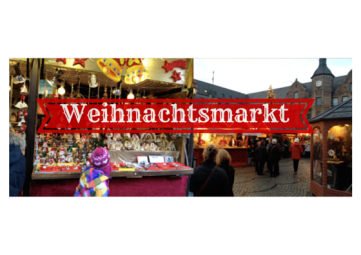
What to eat at Christmas…
Christmas is a time to celebrate thankfulness and togetherness and traditionally this is made by sharing meals. In Italy, Christmas is the most important celebration. Families have a festive dinner on the vigilia di Natale (also called cenone di Natale) on Christmas Eve, December the 24th, where traditionally fish is served (after antipasti and primi).
The birth of Jesus is celebrated on the 25th December by cooking festive meals that are followed by panettone (wich is similar to the German Weihnachtsstollen!), pandoro and torrone.
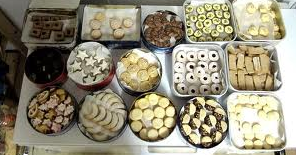
In Germany, the traditional Christmas meal in my extended family was the Weihnachtsgans (goose; some prefer duck). My grandma served it with red cabbage and potatoe dumplings (find more recipes – in German! – here) after a soup, and Christmas cookies and Christstollen afterwards. – In our family in Italy, we used to have trout for lunch (after antipasti and primi) on the 25th, and some panettone, pandoro, torrone, Weihnachstplätzchen and Lebkuchen… Not all together, of course, but nicely devided over the Christmas holidays… Our Swiss family likes to celebrate with a raclette made with cheese, but meat is also a great alternative and this is very similar to the Dutch gourmetten.
When to open the presents…
In Switzerland, the Netherlands and Germany, the presents are handed out on Christmas eve (24th December). The family gathers around or in front of the Christmas tree and sings songs. Children play the piano, the flute or other instruments, and only after having sung Christmas carols all together, everyone opens their presents.
In Italy, like in the US, it is custom to receive the presents on the 25th. – In many multicultural families it is very difficult to agree on the way to celebrate Christmas, on how and when to hand presents.
Is Father Christmas bringing the presents or are they offered by family members? My husband and I agreed that as long as our children believe in Father Christmas (Weihnachtsmann), he would be the one bringing the presents – like Sinterklaas a few weeks earlier. In order to have a smooth transition to the “reality” and less magical Christmas, once they’ll know the truth about Father Christmas, we let extended family offer personal presents, so that our children can thank them for their gifts. This combination of traditions is an important aspect of these celebrations which really needs to be agreed with the whole extended family in order to avoid misunderstandings and frictions. (this was in 2014; meanwhile our children know about Father Christmas and celebrate it more like adults)
What we celebrate now
Since we live in the Netherlands, our festive time of the year starts when Sinterklaas arrives to the Netherlands in his stoomboot end of November, and ends the 6th of January with the Heilige Dreikönige and the Befana. – Our children follow the whole story about Sinterklaas and his Zwarte Pieten and zetten de schoenen almost every evening. When Sinterklaas returns to Spain on the 6th December, we start decorating our home for Christmas with symbols.
It is common practice to celebrate the Advent (from Lat. adventus “coming”) by lighting one candle every Sunday before Christmas, to symbolize the time of expectant waiting and preparation for the celebration of the Nativity of Jesus Christ.
The readings for the first Sunday in Advent relate to the old testament patriarchs who were Christ’s ancestors, so some call the first advent candle that of hope. The readings for the second Sunday concern Christ’s birth in a manger and other prophecies, so the candle may be called of Bethlehem, the way or of the prophets. The third Sunday, Gaudete Sunday after the first word of the introit (Philippians 4:4), is celebrated with rose-colored vestments similar to Laetare Sunday at the middle point of Lent. The readings relate to St. John the Baptist, and the rose candle may be called of joy or of the shepherds.(…) The readings for the fourth Sunday relate to the annunciation of Christ’s birth, so the candle may be known as the Angel’s candle. (cfr. Wikipedia)
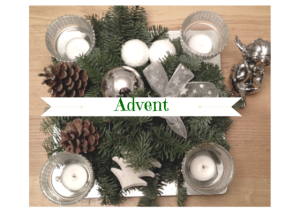
Once the advent wreath is in its place, we slowly add a few decorations like candles, the winter scenery our children decided to set up some years ago (and we add some details every year) and a presepe.
If you would like to know more about Advent, have a look at this post on ExploreGod.
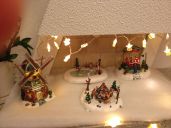
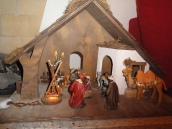
How we are going to celebrate Christmas this year (2014)
This year we’ll celebrate Christmas in the Netherlands. The past we’ve mainly been travelling during this time and this year I really want to stay put.
This year, my parents will come to visit and we’re all very excited to have them! We have made plans about what we want to do with them.
Christmas, for me, means to spend time together, to focus on one another and enjoy the festive atmosphere. I like the smell of Christmas: the mix of cinnamon, candles, hot chocolate, sometimes Glühwein, Lebkuchen, roasted almonds and marroni. We’ll have a cenone di Natale with antipasti and fish, and on the 25th we’ll do like the locals and opt for gourmetten: similar to the Swiss raclette, fish, meat and vegetables are cooked on small stoves directly at the table and everyone can serve himself. Or we’ll make a fondue… Our children will open their presents on Christmas Eve and we’ll enjoy the erste Weihnachtsfeiertag by having a great festive lunch and going for a long walk maybe at the beach.
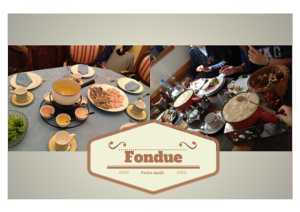
©expatsinebirth2014
This year my children will get to decorate the Christmas tree with their grandpa. We’re all not getting any younger and I want this Christmas to be a time to build memories. Christmas is the time of the year where we not only are aware of the beginning of an era – a new year! – but also of the ending of one… For me Christmas is a mix of feelings: some sadness about the year that passed, friends who left, but also the excitement about the new. In German there is a nice word for it: Besinnlichkeit. In some countries people have just celebrated Thanksgiving and this spirit of being grateful and thankful for me is the spirit of Christmas that I want my children to associate with this time of the year. I think this is the heritage I want them to have. No matter how and where they’ll celebrate their future Christmases: I would love them to focus on this Christmas feeling.
I know it’s still a few more days until Christmas, but I’d like to wish you all a besinnliche Weihnachtszeit (“reflective Holiday Season”), un buon Natale, un joyeux Noël, en gueti Wienachtsziit, Merry Christmas, Feliz Navidad, Boas Festas and een vrolijk Kerstfeest!
Categories: Being expat, Culture/Traditions, Expat Life, Family, Holidays, Life with children, Netherlands, Parenting, Raising TCK's, Switzerland, The Hague




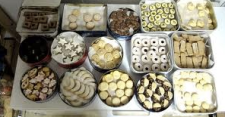

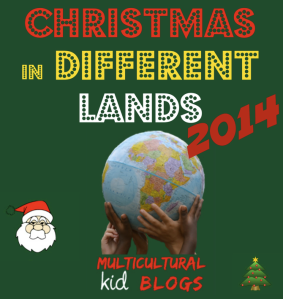




Dear Ute,
I like this post of your very much. I can see that you’re really a bit different from the Dutch around us, you regard the holiday season mainly a means of cherishing life with your family.
I only have one strange question, regarding these associated customs in this country: how can you all put up with the gregarious, harsh, over-commercialized Dutch Sinterklaas? Don’t get me wrong, I’m fine with their ways as they are, I just don’t like to be drawn in and that could happen in different ways: first of all, when I’m with my ‘grand-children’ (half-Chinese, half-Dutch, me not a real but a practicing grand-pa), I find it hard to resist to tone down or switch the TV completely off when, by sheer chance, the many-hour-long Sinter-programmes come up unavoidably. Thank somebody, the mother is Chinese and isn’t really interested in promoting Sinter to her kids either.
Other than this, I’m also thankful that I could pass a number of Zwartes in the street without getting any approaches in the way we did when we sat at school in Dutch classes – then it was an unavoidable embarrassment for me, though I managed to keep that in bay by keeping a very low profile. I considered it as an intrusion into my private life almost as much as when in China I was approached my local contact to go out for Christmas into a country house (I could almost say ‘datcha’ from Russian) to enjoy, celebrate, drink (in the never-ending Chinese ways) and have fun with girls. On that accasion, when I said ‘no thank you, I have different ideas due to my own culture on Christmas’, I made the guy my enemy with the refusal to his generous gesture.
So, as far as I see, the Dutch celebrate things in December in a way completely foreign to me and probably just as foreign to you, so I’d like to know how you feel about this way. But if it’s too complex and difficult, you can just disregard this message.
Kindest,
Peter
LikeLike
Dear Peter, Thank you very much for your very kind comment. We celebrated Sankt Nikolaus in Italy, but without any white bearded man showing up at our door with his helper Knecht Ruprecht.
I think I would have had exactly the same reaction you had at school in NL. The first time I experienced a real Sankt Nikolaus celebration I was almost 20 and it was in Switzerland. I was horrified about Schmutzli (the Swiss helper) hovering a wip over little 5 year olds who tried to perform a poem and were visibly intimidated. The adults smiled (!) and for some strange reason were not worried about the children.
Fast forward to when we experienced our first Sinterklaas in the Netherlands: I knew about the Zwarte Pieten and Sinterklaas but I was surprised to find pepernoten and Sinterklaas decorations in the supermarkets already in September (!) and didn’t understand why they would be so excited about his arrival end of November. Then we discovered how a whole nation can passionately – and I agree with you, it can really become “too much” – during the weeks before December the 5th. To be honest I was fascinated to see grown ups and children enjoy this period of the year. I, for myself, was keen to understand this tradition and just observed what the locals did: how they celebrated this festivity and read about it; i.e. Sinterklaas comes from Spain in NL, whereas in Germany and Switzerland he comes from the woods etc..
My son attended a Dutch crèche and I learned the songs, read children books about this and tried to understand what’s all behind this celebration.
We adopted the Dutch way to celebrate Sinterklaas mainly because our children are immersed into the Dutch culture, and sharing traditions helps to develop the feeling of belonging. The way this festivity is celebrated here is part of this culture, it’s tradition and we decided for our family to adopt it.
But we also maintained the German/Swiss way to celebrate Christmas and combined the Italian/German/Swiss way to celebrate January the 6th. Maybe this seems a bit too much, but maintaining these traditions is, for me/us, a way to stay connected to the cultures we know and love.
LikeLike
Dear Ute, Again, great thanks for your kindest reply to my strange feelings. I understand you better now. Yes, the time may come for me too to being nearly immersed in this craziness when these two kids get into it in a few years, but above 60, I don’t really think so. I wasn’t immersed into it above ten any more, didn’t have to when I was a teacher either (though we did a nice evening each year for the colleagues who had ‘kleuters’, but that was also long ago. Now I can only feel sorry for this overblown part of this otherwise calm culture of the Dutch only comparable to their craziness on queens/kings’ day.
LikeLike
This will be our first Christmas back in the UK after returning from Bangladesh last December. For us there will be many bittersweet memories and a strange mixture not just of cultures but of sadness and joy. What’s most important, however, is that we’re celebrating Christmas with family and making it all as memorable as we can.
LikeLike
Ken, I really understand what you mean. I hope that you and your family will find a way to combine the cultures and habits in a way that makes it a very special and new kind – very personal? – Christmas for you? Repatriating families often have the impression that they “go back” and need to “redo things like before”, but we always have the choice to change. You’ve all changed over the years (we all do, no matter if we live(d) abroad or not) and you can give these more traditional moments a personal touch that will be more than memorable. – I’m sure you’ll know how 😉
LikeLiked by 1 person
What a beautiful post! It sounds like your children are really getting the best of all worlds! You really evoke what is beautiful about all of these traditions. And how special that your parents will be able to visit. As you say, being together with friends and family really is the most special part of Christmas.
LikeLike
Thank you, Leanna! I’m very glad you liked this post. Yes, my children are combining many things coming from the different cultures they know. Not only languages 😉 And yes, it is very special that my parents are here for a Christmas visit. Being with family and friends is the most important aspect of this festive season.
LikeLike
Awesome post! I have always wanted to experience Christmas in Europe – funnily enough I had a conversation with my partner about exploring the world during the Christmas period. Learning new cultures on worldwide holidays such as Christmas, I think will definitely be such valuable experiences in life. So far, I have celebrated Christmas in the States, Africa and the UK. I think eating Fish on Christmas Day is a great idea!
LikeLike
Dear Dominic, I’m really glad you liked my post! What a great idea to explore the world during the Christmas period! It surely would be a great experience, although Christmas is a very family centered celebration and it may be difficult to really participate in this kind of celebrations and have a look “behind the scenes”. But it’s surely worth a try! – I’d love to know what your experiences in celebrating it in the States, Africa (where in Africa?) and the UK are.
LikeLike